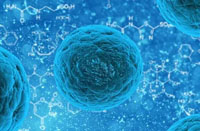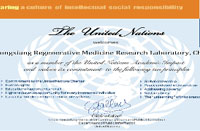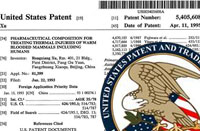Chinese Life Scientist showing skeptical attitude towards iPS Cells Cloning Mice Study
[Chinanews report on 29th of July] British journal ‘Nature’ published a piece of news on a success in mice cloning with iPS cells by a team of Chinese scientists on July 23rd, 2009, which arose the great interest among mass media in China. While some specialists were cheering up on this news, however, some others showed their suspect and upset towards the study itself and the potential negative consequence. Among them, Dr. Xu Rongxiang, one of the Chinese life scientists, who is also the inventor and US patent winner of somatic cells induced stem cells technology as well as human tissues and organs regeneration and rejuvenation in situ technology, also claimed his apposition against the study by presenting his analysis on the study from three aspects including ethics, safety and technique proliferation.
Dr. Xu stated his arguments to the interviewer today. He said the reason why I apposed the iPS cells cloning mice study could be explained from three levels. First is about the ethic concern. Because the study was obviously involved in cells cloning embryo technology by resulting in the formation of three embryonic germ layers, which is considered as the warning line of the ethical standard for international cells cloning technology. The goal of the study on cells cloning technology is to explore solutions for diseases and health preservation. On the contrary, that study has already gone against the right way by conducting life reproduction cloning; secondly, from the aspect of safety, iPS cells the genes reprogrammed cells with virus, exogenous genes and cancerogenic hazard, thus are not the optimal stem cells as is expected by the public. If taken simply, iPS cells can be thought as a kind of carcinomaticly dangerous transgene food, while their threats are already a fact instead of an assumption as the transgene food. Therefore, the cloning with such dangerous cells will not lead to any meaningful applicable results; the third apposition is on its technique proliferation. Today, it is not complicated to conduct a tetraploid embryos-ES cells chimera technique. The technique used is introduced in Study handbook published in 2003, which achieved the chimera of iPS cells in the tetraploid embryo derived from zygote, which is then implanted in the uterus for further development. The simplicity of the technique allows every ordinary biotechnical staff to apply, which is worsened by the publication of the success in cloning virus and abnormal genes carrying mice, indicating that human cloning is totally possible for it is much easier than the technique of animal cloning with skin cells. Nevertheless, iPS cells are dangerous, which could lead to the human catastrophe when abused by lawless persons on humans. All the countries worldwide have laid down laws on the application of embryonic stem cells cloning animal technique to ban any studies on humans, though no legislation is available on the use of iPS cells cloning animal technique to protect human rights. Therefore, it is appealed that relevant laws and regulations will soon come into force.
According to Dr. Xu Roingxiang, immediately after the publishing of the news by Nature, lots of foreign scientists gave their comments. Dr. Robert Lanza from Advanced Cell Technology of Massachusetts stated that cloning is to isolate nuclear from one cell and to implant it into a zygote. The cloning technique has never been applied on humans; neither has the new iPS cells cloning technique been. Further, he added that the application of the technique on human study can be succeeded as long as is has already been a fact on mice. ‘We now have the technique to create iPS cells from skin or hair follicle and these cells can actually create living organism. It is terrible.’ ‘All the requirements for technique abuse are ready, and the only unknown left about its effect on human body may be verified by someone really trying it on humans.’ Catherine plath, another biologist from Broad Regenerative Medicine & Stem Cell Research Center of Los Angeles, UCA stated that no such study should be allowed. ‘To review the mice cloning study, many of the cloned mice died or suffered genetic abnormality’, she said.









